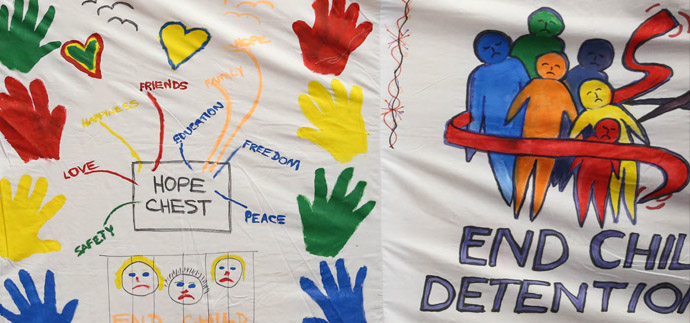Today is World Refugee Day. An annual opportunity to not only reflect on the struggles faced by asylum seekers and refugees around the world, but also to celebrate their many and varied contributions. Many Uniting Church Congregations are passionate about advocating for refugees. They are active in lending a helping hand and putting their voice behind the call for Australia to adopt a more welcoming, compassionate response to refugees.
During Refugee Week this week, UCA President Rev. Prof. Andrew Dutney called on Australians to “take five” to hear stories of refugees and reflect upon their courage and contributions. Taking time out to re-imagine Australia as a compassionate, welcoming community.
We took five with Meredith Williams from Dee Why Uniting Church to hear about her experience as an advocate for refugees.
What inspired you to be involved with refugee advocacy?
My late husband was involved in providing hands on help for refugees and I have kept this work alive through my life.
We were in contact for many years with three young men who came to Australia seeking asylum. One of them arrived around the time of the Tampa incident. He was 16 years old and spent four years in Nauru detention centre. He lost his adolescence. We assisted the young men throughout the process of coming off protection visas to getting residency and then citizenship. We helped them travel back to visit their families. One of them is now a police constable, and another completed a Tafe course in business.
What do you think about Australia’s policies around refugees and asylum seekers?
I believe the current government’s policies are inhumane and counterproductive. They campaign to invent an enemy. Their rhetoric is dishonest and it amazes me that they can get away with listening to a powerful minority.
But I think the tide is turning. It’s a question of how we unpack this decade-long vendetta and stop swallowing the use of negative, misleading language like “illegal arrivals” and ‘queue jumping’. We just need to show a different face to what the government shows.
What kinds of advocacy for refugees have you participated in?
I’ve had letters published in newspapers and I take every opportunity to talk to people about the plight of refugees. I like getting people fired up enough to take action, to educate and stir similar passions, and provide a voice and a forum to speak about them.
I’m currently doing the Ration Challenge with Act For Peace, to raise funds for refugees by living off the same rations as a Burmese refugee for a week — rice, flour, salt, fish, split peas and oil. It hasn’t been much of a hunger thing; but the deprivation from our usual routines and indulgences has been the hardest part!
How does your Congregation support refugees?
Our congregation has a Refugee and Asylum Seeker Working Group which has been running since October 2014. We discuss our concerns, share information to educate each other and the wider Congregation, and write letters to politicians voicing our opinions. We have written countless letters to the Prime Minister and local politicians. We all received an identical, insufficient reply to our letter about children in detention, and that made me say, “I’m not going to settle on this.”
Dee Why has the largest concentration of Tibetan migrants in Australia, many of them are refugees, having fled Tibet into Nepal. As they are Buddhist, there’s a real interfaith community. Our Church provides a space for their community gatherings and prayer services, particularly for visiting dignitaries.
The Church also provides a place for refugees who have survived trauma and torture to access psychiatric and social services and assist their transition into society. They can build relationships and skills in a safe place.
How do you think Congregations can be more effective in advocating for refugees?
It’s an issue most people are passionate about, but no-one has hands on personal experience. Look at the Tibetan migrants in Dee Why, for example. They’re right there in front of us. People need to have real connections, not just tokenistic ones, and genuine relationships take time.
If you have a group of like-minded people, you’ve got to persevere.
For more information about how you and your Congregation can help asylum seekers and refugees, click here.













